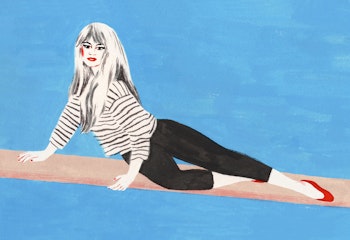Is there anything more sartorially satisfyingly simple than wearing Breton stripes in the summer? Ever since 1917, when Coco Chanel took the prescribed get-up of Gallic sailors and made it chic for civilians on sun-soaked Riviera streets, it’s become a seasonal unisex staple. We’re particularly fond of it – as you may have guessed from our striped notebooks, notecards, and even packaging. So we decided it was only right to take a closer look at our favourite item of summer clothing.
 Coco Chanel
Coco Chanel


Originating in Britanny, on the North West coast of France (Bretagne in French – hence the name) the iconic shirt was first introduced as the uniform of the French Navy in 1858. It was striped to allow unfortunate sailors who'd fallen overboard to be easily spotted, with the white stripes twice the height of the blue ones, of which there were 21 to denote each of Napoleon’s victories.
In the 1910s, Coco Chanel was on a mission to free the female form from the formal fashions of the era. The restrictive outfits were not the most comfortable and as the great fashion revolutionary declared: "Luxury must be comfortable, otherwise it is not luxury." This felt particularly true for the bourgeoisie who were increasingly holidaying on the Côte d'Azur; lounging luxuriously under the sun required a more relaxed style and the Breton shirt was the perfect fit.
 Pablo Picasso
Pablo Picasso
Both films by legendary French filmmaker Jean-Luc Godard

In the mid-century, Pablo Picasso adopted the stripes as his artistic workwear and thus began a history of the Breton bonded with the bohemian. It became the ultimate symbol of Gallic cool in the 1960s with the groundbreaking cinematic movement of the Nouvelle Vague – Brigitte Bardot wearing it in Le Mépris and most famously, Jean Seberg in Breathless. The shirt made similar waves across the Atlantic too when James Dean sported one in Rebel Without A Cause and the ever image-conscious Andy Warhol was regularly photographed in it.

Gaultier wore them with everything – even kilts.
The lineage of creative talent dressing in Breton stripes continued down the decades. Most notably in the 90s when Jean Paul Gaultier commandeered the design as the signature style of his eponymous fashion label. Perhaps it is its simple graphic beauty which draws those with an eye for art and design towards it? There must be some reason that explains why the entire Papier creative team have, on more than a couple of occasions, unintentionally turned up to the studio in various coloured stripes.

It's certainly had an effect on some of Papier's designs. From notebooks to notecards and even the envelopes we delivery our greeting cards in, we have a penchant for a striped pattern. But how could we not? It's clear to us that the pattern made popular by Coco Chanel, the Queen of chic, makes for exceptionally stylish stationery.













